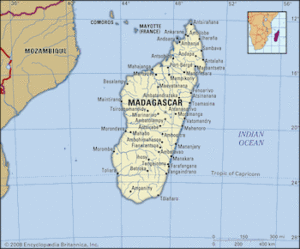
*On this date in 1960, Madagascar became an independent country from France, and Philibert Tsiranana became its first president. Seventy-six years after the Berlin Conference, the high point of white European competition for African territory was a process commonly known as the Scramble for Africa. The Malagasy Republic, proclaimed on October 14, 1958, became an autonomous state within the French Community. On March 26, 1960, France granted Madagascar complete independence.
Independence evolved in three republics until the 21st century. Tsiranana's rule represented a continuation, with French settlers (or colons) still in positions of power. Unlike many of France's former colonies, the Malagasy Republic strongly resisted movements toward communism. In 1972, protests against these policies began, and Tsiranana had to step down. He handed power to General Gabriel Ramanantsoa of the army and his provisional government. This régime reversed previous policy in favor of closer ties with the Soviet Union. On February 5, 1975, Colonel Richard Ratsimandrava became the President of Madagascar. After six days as head of the country, he was assassinated while driving from the presidential palace to his home. Political power passed to Gilles Andriamahazo.
Second Republic (1972–1991)
On June 15, 1975, Lieutenant-Commander Didier Ratsiraka (previously serving as foreign minister) came to power in a coup. Elected President for a seven-year term, Ratsiraka moved further towards socialism, nationalizing much of the economy and cutting all ties with France. These policies hastened the decline of the Madagascan economy, which had begun after independence as French immigrants left the country, leaving a shortage of skills and technology behind. Ratsiraka's original seven-year term as President continued after his party, the Avant-garde de la Révolution Malgache (AREMA), became the only legal party in the 1977 elections. In the 1980s, Madagascar moved back towards France, abandoning many communist-inspired policies in favor of a market economy, although Ratsiraka still retained power. Eventually, opposition, both within and without, forced Ratsiraka to consider his position, and in 1992, the country adopted a new and democratic constitution.
Third Republic (1991–2002)
The first multi-party elections came in 1993, with Albert Zafy defeating Ratsiraka. Despite being a strong proponent of a liberal, free-market economy, Zafy ran on a ticket critical of the International Monetary Fund (IMF) and the World Bank. During his presidency, the country struggled to implement IMF and World Bank guidelines, which were, in the short term, politically suicidal, as President Zafy was frustrated by the new constitution's restraints on his office's powers. His quest for increased executive power collided with the parliament led by then Prime Minister Francisque Ravony. Zafy eventually won the power he sought but suffered impeachment at the hands of the disenfranchised parliament in 1996 for violating the constitution by refusing to promulgate specific laws.
The ensuing elections saw a turnout of less than 50% and unexpectedly resulted in the re-election of Didier Ratsiraka. He moved further towards capitalism. The influence of the IMF and the World Bank led to widespread privatization. Opposition to Ratsiraka began to grow again. Opposition parties boycotted the provincial elections in 2000, and the 2001 presidential election generated further controversy. The opposition candidate, Marc Ravalomanana, claimed victory after the first round (in December), but the incumbent rejected this position. In early 2002, supporters of the two sides took to the streets, resulting in violent clashes. Ravalomanana claimed that fraud had occurred in the polls. After an April recount, the High Constitutional Court declared Ravalomanana president. Ratsiraka continued to dispute the result, but his opponent gained international recognition, and Ratsiraka had to go into exile in France; however, forces loyal to him continued their activities in Madagascar.